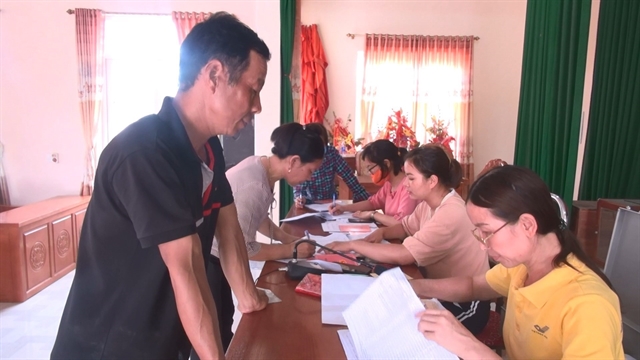 Society
Society


|
| Beneficiaries of the Government's social welfare bailout package in Thọ Xuân District, central province of Thanh Hoá submit local authority papers saying they would not receive the support. — VNA/VNS Photo Khiếu Tư |
THANH HOÁ — More than 2,000 beneficiaries of the Government’s social welfare bailout package in Thọ Xuân District in the central province of Thanh Hoá refused the support, claiming that the benefits should go to those in more desperate need.
The bailout package worth VNĐ62 trillion (US$2.66 billion) was implemented late last month to support people affected by the COVID-19 pandemic nationwide.
Accordingly, employees who take unpaid leave and those who have their labour contracts suspended for at least one month will receive VNĐ1.8 million ($77) each month. Employers in financial trouble who have continued to pay staff at least 50 per cent of the salaries will be allowed to borrow money from the Vietnam Bank for Social Policy with zero interest for three months to pay the outstanding wages to their staff.
Individual business households with taxable revenue of less than VNĐ100 million ($4,288) per year that have closed since April 1 will receive VNĐ1 million ($43) per month for a maximum of three months.
Employees who have their labour contracts terminated and are ineligible for unemployment allowances and employees who have no labour contracts and lose jobs will receive VNĐ1 million per month.
People who contributed to the national revolutionary cause and social policy beneficiaries will receive an allowance of VNĐ500,000 ($22) each month from April to June, in addition to their monthly allowances. Poor and near-poor households will receive VNĐ250,000 ($11) per month from April to June. All of the payments will be made in a lump sum.
As local governments reviewed the list of beneficiaries in their localities, they also received feedback from local people who don’t want to receive the allowance. Instead, the beneficiaries said the Government should hand over the allowance to those who are facing more difficulties caused by the COVID-19 pandemic.
In other words, they wanted to donate their allowance to those who need it most.
Đỗ Thị Hiền, a resident in Xuân Lập Commune, Thọ Xuân District, said her family was a near-poor household and her husband was in poor health due to a collarbone fracture.
“Hearing the news on TV, newspapers and radio, I knew that many people across the country overcame difficulties to fight the COVID-19 pandemic, including health workers, soldiers, police and border guards,” Hiền said.
Women aged between 70 and 80 donated vegetables and rice to help people who were heavily affected by the pandemic, Hiền said, adding that her family also wanted to do something for the community.
As soon as she was told about the support worth VNĐ3 million, Hiền wrote to local authorities, saying she would not accept it.
Many poor and near-poor households in Hiền’s neighbourhood also volunteered to not receive their allowances, so that Government would have more funds to help those in need, said chairman of Xuân Lập Commune People’s Committee Lê Đình Hải.
By May 11, over 2,000 people in Thọ Xuân District refused to accept the allowances which totalled over VNĐ 1.5 billion, including 850 people in Xuân Phong Commune, 577 people in Xuân Lập Commune and 239 people in Thuận Minh Commune.
Nguyễn Ngọc Thức, vice chairman of the district People’s Committee said that the targeted beneficiaries of the bailout package saw the difficulty the whole country was facing during the COVID-19 pandemic, so they refused Government’s support to save it for those in dire need.
“It’s an act of sharing and their responsibility to the community,” Thức said.
He said that local authorities appreciated and commended them through messages on a loudspeaker system.
The list of beneficiaries who refused the allowances was posted at the communes’ community houses and offices of the communes People’s Committees to ensure transparency, Thức said.
Meanwhile, in the central province of Hà Tĩnh, 31 people from two poor households and 15 from near-poor households in Cẩm Lạc Commune volunteered to not receive allowances from the Government’s VNĐ62 trillion bailout package, said vice chairman of the commune People’s Committee Nguyễn Văn Dũng.
Võ Thị Lan, 49, and her husband Võ Hữu Tôi, 57, agreed not to receive the allowance although they are considered a near-poor household in the commune, with two of their children living with mental disabilities.
Lan said that her family was very happy and thanked the Government for their care during difficulties caused by the COVID-19 pandemic.
However, her family could make ends meet thanks to their 4-sào rice field [1 sào equals 500 sq.m] and their work harvesting a 6-sào rice field belonging to neighbours.
“Please give our allowances to those who face more difficulties at this time,” Lan said.
Vice chairman Dũng said that the local authorities had reviewed the list of beneficiaries of the bailout package and have been delivering allowances to them.
The commune has 924 people benefitting from the package. — VNS




